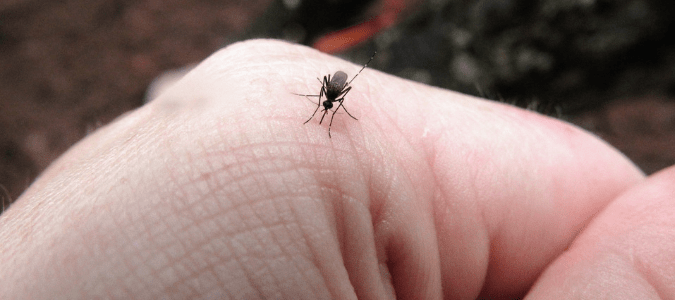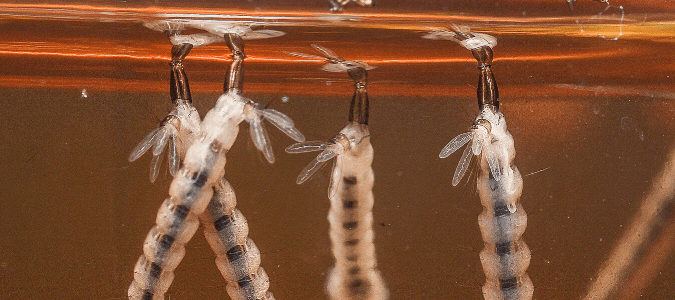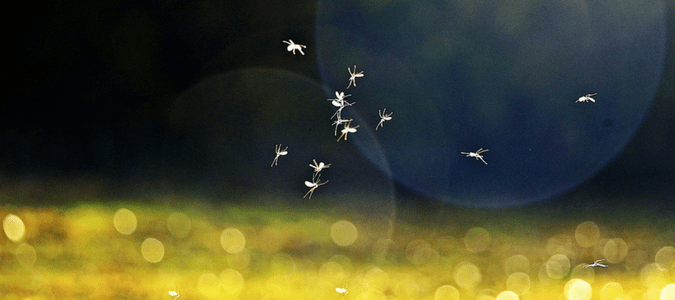Do Mosquitoes Come Out in the Rain?

So how do these tiny insects, which are known for being weak fliers, manage to survive being pummeled by raindrops? The answer has to do with the fact that mosquitoes have very little body mass as well as very strong exoskeletons. When they are hit by raindrops, they can be enveloped by the rain. But, then use their wings and legs to pull out of the water and keep flying.
Not only can mosquitoes fly when it’s raining, they actually depend on rainfall to reproduce. If you’ve ever noticed that rain seems to bring out mosquitoes in droves, you weren’t imagining things. The main time when mosquito populations boom is after a rain. This is because female mosquitoes lay eggs in standing water, like the water that collects after rain falls. Depending on conditions like the temperature outside, it can take as little as a week for those eggs to hatch. These hatched eggs then become full-grown, adult mosquitoes in search of a victim to bite.
This is why controlling mosquito populations depends on dumping out standing water after it rains, or even after using your sprinklers. Any place where water collects, including in planters, bird baths, children’s toys, old tires or even low spots in the yard, can become a prime spot for female mosquitoes to lay their eggs.
Female mosquitoes are actually the only mosquitoes that bite people. Male mosquitoes live on flower nectars and plant juices. And the females of the species don’t need mammal blood for food. They need its proteins specifically to help their eggs develop. Using insect repellent spray can help keep mosquitoes away from you when you’re doing yard work or spending time in the yard. But, preventing mosquitoes from reproducing is a more effective approach long-term.
There are several things you can do to keep mosquito populations down in your yard and around your property. And, almost all of them are green tips that have to do with basic yard maintenance:
- Every time it rains (or after you run your sprinklers), go outside and look for places where water has collected. Dump out any standing water you find, even small amounts—mosquitoes can breed in surprisingly tiny amounts of water.
- Keep dead leaves and underbrush cleared away, since leaf piles can collect enough water after a rain to support mosquito eggs.
- Mow the lawn regularly throughout its growing season and keep any bushes or landscaping trimmed. This is because mosquitoes hang out in tall grasses and bushes when they aren’t flying around and biting people.
- Keep your gutters clean and well-maintained. Gutters and downspouts that are blocked by leaves and debris are a prime, and often overlooked, spot for mosquito breeding.
- When you’re going to spend time outside, wear long pants and long sleeves if possible, and preferably in a lighter color. Mosquitoes have been found to be more attracted to darker clothing, so this may help prevent bites. You can also use insect repellent products to keep these annoying pests away from you while you’re outdoors.
If you follow all these steps and you still have a mosquito problem, it’s time to contact a professional. A reputable pest control company can zero in on the root causes of your mosquito infestation, recommend the best ways to treat the problem and set up an ongoing treatment schedule. A professional can even answer your questions, like do mosquitoes bite during the day? That way, you can enjoy your outdoor living spaces once again.

What Do Mosquito Eggs Look Like?
Mosquitoes lay their eggs against the insides of containers with standing water inside. They are usually either just above the water line or right on top of the water. Depending on which species the female mosquito happens to be, she might lay her eggs individually or together, in groupings called rafts. Once the eggs hatch into twitching, dancing little larvae that hang down from the surface of the water, they become visible. But, what do mosquito eggs look like? Are they visible to the naked eye, or are they too small to see?
Mosquito eggs are tiny, so they are very hard to see without the help of a magnifying glass. If you did look at them under magnification, you would see little whitish, brownish or black things shaped like pellets. Mosquito eggs are longer than they are wide, and pointed at the ends. Mosquitoes that lay their eggs in rafts can lay hundreds of eggs together, but even a few hundred eggs creates a raft that is less than a quarter-inch wide! That gives you an idea of how small individual mosquito eggs really are.
Given the right conditions, mosquito eggs might take just a day or two to hatch into larvae. Mosquito larvae, which you can see in the image above, are more easily visible to the naked eye. This is in part because they move around a lot in twitching, wiggling, almost dance-like motions. Long, thin and light-brownish in color, they hang down from the surface of the water for as little as four days and up to a couple of weeks. In this stage, they molt three times before transforming into pupae.
Mosquito pupae are rounder in shape than larvae, and they move in the water in a tumbling motion. They can hatch into adult mosquitoes in as little as a day and a half. The entire life cycle process, from egg to adult mosquito, can take as little as a week. Mosquito eggs can also survive through the winter and wait to hatch into larvae when warmer weather returns.
Whether they hatch soon or after several months, mosquito eggs are triggered to hatch when they are covered in water. This can happen when it rains, or when you use a hose or sprinkler to water your yard or your potted plants.
Since mosquito eggs are so hard to see, and since they can actually survive for months until conditions are right for them to finally hatch, you might not realize you have hundreds or even thousands of mosquitoes just waiting to emerge in your yard. This is why hiring a professional pest control company can be so helpful. With regular, scheduled visits and an approach custom-tailored to your specific yard conditions, a professional can be an invaluable partner in controlling these pests.

Do Mosquitoes Hibernate?
You may notice that the mosquitoes that plague you and your family all summer long seem to disappear once the temperature outside drops in the fall and stays consistently low for a while. Does this mean cold weather kills off mosquitoes, or do mosquitoes hibernate? Unfortunately, while mosquito activity does drop in wintertime, even freezing cold temperatures may not kill off these pests. Some species of mosquitoes do hibernate, while others lay eggs that can withstand the cold of winter to hatch when springtime returns.
Some mosquito species overwinter in egg form. The adult female mosquitoes will lay their eggs in water in the fall. Then, when temperatures start dropping below about 50 degrees Fahrenheit, the unhatched mosquito eggs can go into a dormant state. In this state, they don’t die but they also don’t develop. They just pause until two things happen: the temperature rises and rain starts falling once again, submerging the eggs in water. These are the key triggers that signal mosquito eggs that it’s time to start developing into larvae.
The adult females of certain mosquito species can also hibernate through the winter. These mosquitoes mate in the fall and then hibernate during winter in protected spaces like hollow logs, animal burrows or even basements of homes. When the warmth of spring returns, these mosquitoes return to normal activity, including biting humans for their blood and then finding suitable spots to lay their eggs.
Since adult mosquitoes and mosquito eggs can survive even a long, cold winter, they can seem to suddenly explode into activity in the springtime, almost out of nowhere. Hiring a pest management specialist will go a long way toward keeping mosquitoes under control, year-round. That way, you won’t be taken by surprise at just how quickly mosquito populations can boom in springtime.
Chem-free Can Reduce Mosquito Populations on Your Property
Mosquitoes can make you miserable. Instead of dealing with obnoxious bites, contact Chem-free Pest Control. We offer holistic methods of pest control that have baby safety in mind. This way, you can feel comfortable at home again.
Need Help Managing Pests?
Chem-Free offers both effective, low-impact pest control options and preventative measures to help avoid future infestations. Contact us today for a free estimate!


